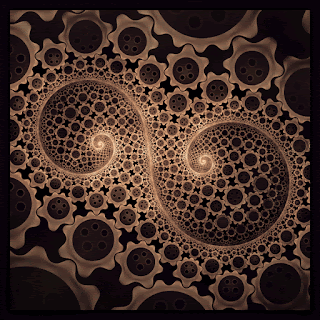The administrator met you at the door, directed you to seat yourself in the over-stuffed chair in front of the coffee table, and excused themselves with the declaration, "My kitchen has requested a few more minutes of my attention before we begin . . . Oh . . . If you find a cat in your seat, that's good luck for both of you! . . to discover if you can share."
There was just enough time for you to be impressed by the shaded but warmly adorned sun-porch and the bird-sounds coming thru screened windows (unfortunately, no cat) before you noticed the coffee table contained a small number of rectangular porcelain plates—which you thought you recognized from restaurants who needed their strong sauces and spices kept-apart. Each shallow-depression contained: a capsule, a couple of colorful pills, or a different-colored slice of gelatin; also, each of the depression's were labelled with a tiny symbol in the porcelain. As you bent forward in your chair, to see if you could identify any of the markings, you realized the administrator was returning and then-recognized that you already forgot their name.
"Welcome to your first Go On experience." The administrator breezed in with comfortable smiles and full hands. "I am here to administer the artwork for you. Names are an unimportant formality and I prefer not to use titles, as well. Either?
"Nonetheless, I'll guide you. We should exchange as much information as is required by either of us, in as succinct a manner as possible." As the administrator said this, they added two more plates to the coffee table, rearranged them all (focusing on the order of the plate's contents) and raised-up the table in an springy-accordion-manner.
Now positioned in front of you like a dining table, you realized the plates were easily within reach. "Thank you." You paused, catching yourself (*inward smile*) before you mumbled or stammered-out a 'sir' or 'administrator'.
"This page of paper contains the list of supplements in front of you." The administrator rose slightly from their seat beside the table, slid a piece of paper within reach, and resumed the instructions. "The order they are listed, is the order they are displayed; from your left to your right. You should take as much time as you need to read this entire sheet, both front and back."
You began to read. The first symbol reminded you of a slightly-slanted party hat with geometric lines and dots underneath; you assumed it was either Chinese or Japanese. You glanced at the first symbol on the plate on your far left (to match the symbols) ... and the administrator resumed talking.
"I'll pour us some tea. And. As any question arises in your reading-mind, I request you ask it. Please do not save your questions for the end. This is not, at-all, conducive to that. The experience will begin after our tea is done—that's usually, for everyone including myself—about twenty minutes. The tea's caffeine and terpenes will take that long to begin to take effect; so if you finish reading after a few minutes and have no questions, we will sit and watch birds and squirrels until 21 minutes have passed."
You nodded, smiled, and returned your eyes to the paragraph beginning with the party-hat symbol:
Potassium. Milligrams vary by body-mass/weight; rate of metabolism/resting heart rate; fat reserves (brown-fat versus yellow-fat); and other immediately available minerals and vitamins which act as "boosters" or provide "entourage effects". The next line was blank. The line after that only contained: 127mg.
Your mind looked back at the plate. At the one pill in the party-hat location. Not two mass-produced 65mg pills. This was supposed to be one 127mg pill? Made specifically for, whomever? With no pre-prepared questionnaire, this must be an intentional conundrum, you thought. "I have a question." You said.
"Please, just ask. No need to request permission or announce questions." As they added more cream to their own tea and raised the pitcher slightly to your head-shake.
"All these measurements to identify dosage . . . followed by a very specific—127mg, on the page. Either this is an oxymoronic-dichotomy of sorts, intended to confuse, or to entertain, . . . or to . . . see if I'm able to ask questions? To, express my confusion?"
"Yes." The administrator replied with a straight face, "One of those." Then they indicated toward the little dish of sweeteners.
You took a yellow package of something and asked, "If I had taken my 90mg this morning, would the card say: 37mg?"
"No." They replied as they emptied the creamer into their tea.
You smiled, sipped, and continued reading:
Magnesium L-Threonate (preceded by a curly-looping symbol) and followed by: 360mg. The next line explained that this variation of the essential mineral magnesium was a sulfate (or 'salt') and was one of the rare magnesium molecules capable of crossing the osmotic-type of "barrier" surrounding the brain. It further noted that there were, currently, no recommendations (or prevention-cautions) or significant research, regarding this form of brain-accessable-magnesium.
Vitamin D (preceded by a square-D symbol): 1250mg. The next line reflected that less milligrams would be required if, "yesterday's sun exposure was optimal or more-than-average". Then it read, exactly as-follows: If you need to know why you need a vitamin D supplement—ask the administrator. If you already know why, you may take these first three supplements.
By taking the first three supplements, you are stating/acknowledging that you possess full-awareness of your own health conditions/evaluation, and any risks you entertain by taking minerals, supplements, nootropics, or other substances provided by the administrator are completely your decision. You are volunteering to participate.
While you are currently (and always?) evaluating/testing the capabilities of your individual self and mind, you are hereby reminded: You are always able to end this specific experience at any time (and receive a full refund).
It is only asked that you begin to learn to trust the advice of the administrator of the Go On artwork (who, also, may terminate the experience at any time, at their own discretion, and would-then provide a full-refund to you).
KmagD is the first-foundational entourage. KmagD is a daily/bi-daily recommendation, but every human participating in the artwork-experience should consider it a requirement. If you already took KmagD today (or some portion thereof) please inform the administrator at this time. Otherwise, take the three KmagD.
You reached forward, took the capsules and pills from the first three depressions, washed them down with a swallow of tea, and continued reading:











.gif)

.jpg)















































